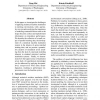609 search results - page 10 / 122 » Multilingual Subjectivity Analysis Using Machine Translation |
112
Voted
COLING
2002
15 years 2 months ago
2002
We present a comparative evaluation of two data-driven models used in translation selection of English-Korean machine translation. Latent semantic analysis(LSA) and probabilistic ...
126
Voted
COLING
2010
14 years 9 months ago
2010
In this paper we investigate the challenges of applying statistical machine translation to meeting conversations, with a particular view towards analyzing the importance of modeli...
92
Voted
LREC
2008
15 years 3 months ago
2008
A new approach to handle unknown words in machine translation is presented. The basic idea is to find definitions for the unknown words on the source language side and translate t...
105
Voted
MT
2000
15 years 2 months ago
2000
This paper sketches the author's research in nine areas related to speech translation: interactive disambiguation (two demonstrations of highly-interactive, broad-coverage sp...
123
click to vote
NLPRS
2001
Springer
15 years 6 months ago
2001
Springer
in machine translation, long sentences are usually assumed to be difficult to treat. The main reason is the syntactic ambiguity which increases explosively as a sentence become lo...

